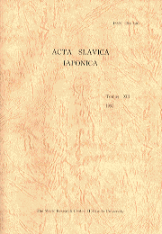Letters of Freedom and Captivity: Scriptal Planning and Language Ideologies in Baltic Central-Eastern Europe
Letters of Freedom and Captivity: Scriptal Planning and Language Ideologies in Baltic Central-Eastern Europe
Author(s): Tomasz WicherkiewiczSubject(s): Sociolinguistics, Philology, Identity of Collectives
Published by: Slavic Research Center
Keywords: Baltic Central-Eastern Europe; letters of freedom and captivity; language ideologies; national identity; national language; national script; Japan;
Summary/Abstract: Most experts in Japan’s political history are aware that the reforms of the state initiated during the Meiji period also instigated a scriptal dispute by adding arguments on national identity to what was later known as 国語国字問題 [=The Question of National language and National Script]. The preference for a script and writing system—Chinese characters Kanji, only Katakana (or Hiragana), or Latin Romaji alphabet—reflected one’s thought about the state and the nation, specifically, the national/state language used for and in a modernized Japan. The Japanese case evidently shows that scriptal issues may directly refer as much to politics and ideologies as to the language ideologies sensu proprio, that is, languages used by so-called “speech communities” as their social communication methods. Although I do not agree to the general criticism of the term “speech communities,” the terminology is inadequate in terms of its reference to communities created, united, or consolidated by scriptal factors.
Journal: Acta Slavica Iaponica
- Issue Year: 2021
- Issue No: 42
- Page Range: 37-54
- Page Count: 18
- Language: English

